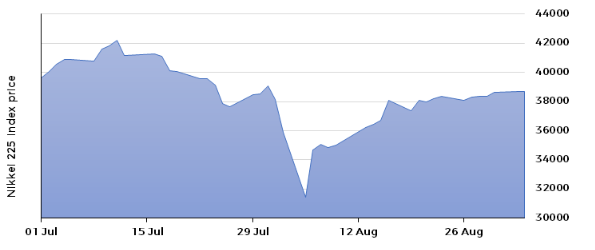Source: Bloomberg, 01.07.24 – 02.09.24. Past performance is not a reliable indicator of future returns.
The world economic outlook, while not exciting, looks fine
The global economy grew at 2.7% in 2023. Forecasts for this year and next suggest growth will be lower than that, around 2.5% or just below.
Through the last decade, following the recovery from the global financial crisis, growth was around 3% per annum, then COVID hit, resulting in a sharp recession and recovery. Growth of around 2.0% – 2.5% is not very exciting. While we have not gone near recession; we are not in boom times either.
However, very recently we have seen some signs that the world economy is weakening a little. Indicators that give a guide to what the future could hold are very useful.
One of those is the Purchasing Managers Indices (PMI), which is a survey of businesses around the world across different industries to acerating their spending intentions. If they are spending, or increasing spending, it would be seen as a positive sign and vice versa.
The global service sector bounced strongly after the COVID period and has remained positive since then.
However the manufacturing industry PMI did not follow suit until more recently, and after a brief spell indicating economic expansion, it has now fallen back to a level that indicates those companies’ spending intentions are not supportive of decent economic growth.
Clearly, these are just two data points in a sea of others, but they are looked at closely.
Inflation has not been the problem we thought it might be
The spectre of inflation loomed large in 2022 and 2023, but it has fallen away this year. Global goods, food and energy inflation are around or even below pre-pandemic levels.
Although, as the PMI’s would suggest, inflation in the service sector remains more elevated. Slowing economic growth should help it fall further.
Overall, while we can’t call victory in the battle with inflation, it is fair to say that the risks to inflation rising sharply again are lower than they have been since the COVID recession.
Pulling that all together
To tackle recession, central banks such as the US Federal Reserve (Fed), Bank of England (BoE) and European Central Bank (ECB) put up interest rates quickly and kept them high.
The BoE and ECB have already started cutting rates, as have many other banks around the world, but the Fed is yet to act.
However, at their annual economic symposium in Jackson Hole in August, the Chair of the Fed gave the strongest of hints that they would start the path downwards at their meeting on 18 September.
The key here is; with inflation muted and looking like it will stay so, and with economic growth subdued, the central banks have plenty of room to act to provide stimulus to their economies.
So, overall, whilst the economic outlook is not exciting, it is far from worrying and it could get better. Not a bad place to be!
Is that all good for my investments?
Macro-economic factors, such as those discussed above have been important in driving most asset classes (bonds, equities, property, and gold amongst others) for some time and that is likely to continue to be the case through the early stages of a phase of interest rate cuts.
It would be supportive of bonds, equities, and property, and possibly less good for gold.
But, back to where I started: while the short term could be volatile, as we saw in August, the long term should be rewarding.



